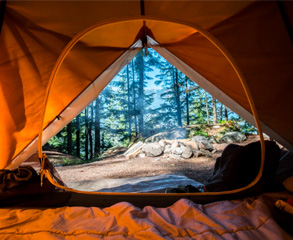Essential Tips for Dealing with Bugs While Camping
Bugs can range from the beneficial to the bothersome, and while not all of them are dangerous, it's crucial to prevent bites and stings while enjoying the great outdoors. Whether you're camping in the woods or relaxing by a lake, knowing how to deal with these pesky intruders is essential for a pleasant experience.
Common Campground Bugs
With approximately 91,000 identified insect species in the United States, you may encounter various bugs at your campsite. Here's a look at some of the most common campground bugs, along with tips on how to handle bites and stings.
Battling Bug Bites
Here are the top annoying bugs you may encounter while camping, along with strategies to keep them at bay and remedies for bites.
No-See-Ums
These tiny flying insects can ruin your outdoor adventure. Their bites are itchier than mosquito bites and can result in welts lasting up to two weeks.
Prevention Tips:
- Avoid wet areas, tall grasses, and piles of debris where they thrive.
- Use dim lights or yellow compact fluorescent lights to minimize attraction.
- Apply essential oil blends (mint, lemon, eucalyptus) around your campsite.
- Reinforce window and door screens with DEET or permethrin.
- Wear long sleeves and pants, and apply insect repellent.
Remedies for Bites:
- Apply ice to numb the area.
- Use toothpaste or rubbing alcohol.
- Try aluminum chloride from antiperspirants for relief.
Mosquitoes
With over 200 species in the U.S., mosquitoes are notorious for biting and transmitting diseases like the West Nile virus.
Prevention Tips:
- Eliminate standing water around your campsite.
- Wear light-colored, long-sleeved clothing.
- Use a fan outdoors to create airflow that keeps mosquitoes away.
- Consider chemical repellents like DEET, or natural alternatives like citronella.
Remedies for Bites:
- Use an ice pack for 10 minutes.
- Apply basil or peppermint leaves, or a baking soda paste.
- Use a banana peel or vinegar for soothing relief.
Deer Flies
Known for their painful bites, deer flies have scissor-like jaws and can chase their prey.
Prevention Tips:
- Avoid wearing blue or dark colors; deer flies are attracted to these hues.
- Use picaridin-based repellents or essential oils mixed with vinegar.
Remedies for Bites:
- Clean the area with antiseptic ointment and apply an ice compress.
- Use natural remedies like aloe vera.
Ticks
Ticks can carry diseases like Lyme disease and are often found in grassy areas waiting for a host.
Prevention Tips:
- Use permethrin on clothing and gear (not on skin).
- Wear light-colored clothing and tuck it in.
- Stick to sunny, groomed trails and use camping chairs instead of sitting on the ground.
How to Remove a Tick:
- Use clean tweezers to grasp the tick close to the skin and pull upward slowly.
- Wash the bite area thoroughly and save the tick for identification if needed.
Bugs with Benefits
Not all bugs are bad! Some, like dragonflies and bumblebees, play beneficial roles in the ecosystem.
- Dragonflies: They eat hundreds of mosquitoes daily.
- Bumblebees: Vital pollinators that help plants thrive.
- Ladybugs: They feed on harmful pests and protect gardens.
- Fireflies: They contribute to research in various health fields.
Praying Mantis: Excellent hunters of pests like mosquitoes.
What to Avoid: Dangerous Bugs
Certain bugs can pose serious health risks and should be avoided:
- Scorpions: Mostly nocturnal and found in dry areas. Their stings can be painful.
- Spiders: Avoid poisonous species like brown recluse and black widow.
- Fire Ants: Aggressive and painful biters that can attack in swarms.
Tips for a Bite-Free Camping Experience
Keep bugs at bay with these simple strategies:
- Plant flowers like marigolds and herbs that repel bugs.
- Use sage and rosemary in campfire packets for pleasant scents.
- Stay indoors during peak bug activity times, usually around sunrise and sunset.
Don't let bugs ruin your outdoor adventure! Share these tips and tricks to help others enjoy a bite-free camping experience.
Related Posts









